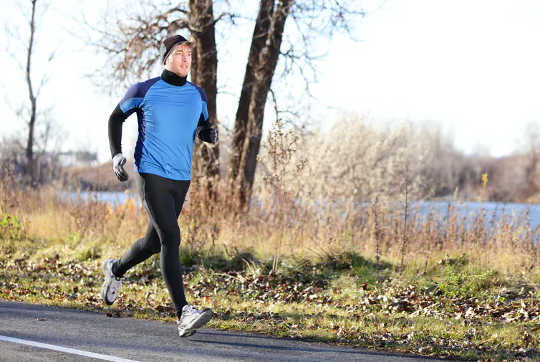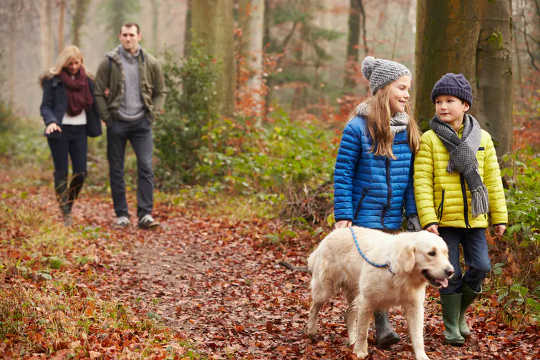
Exercise improves physical health, immunity, and can reduce fatigue. Maridav/ Shutterstock
As winter descends on the northern hemisphere and the temperature drops and daylight hours shorten, many people may want to spend more time indoors. And those of us under lockdown for the second time may feel even less inclined to get outside and exercise. But staying indoors may have unintended health consequences, due to both a lack of physical activity and exposure to daylight.
Being physically active all year long has many benefits to both physical and mental health. Exercise may even counter some of the negative effects winter weather can have on our energy levels and mood.
Research shows people exercise for an average of eight minutes less during the cooler months. People also drop other activities they do during warmer months, such as active travelling. Light intensity activity (such as slow walking and housework) is shown to decrease during the winter, while time spent sitting and sleeping increased.
But, despite decreases in light intensity activity and sleeping more, researchers did not find any differences in terms of sleep quality, nor did it find a drop in moderate and vigorous activities – such as planned exercise classes or walking the dog – which people still did, despite the weather. A pre-print (not yet peer-reviewed) study also suggests that activity levels were lower during the first spring lockdown. This could mean people may be even less active this winter.
Get The Latest By Email
There are many reasons we may lose our motivation to exercise during the winter months. In the winter, low levels of ambient light coupled with shorter days reduces exposure to vitamin D. This causes us to feel tired or fatigued. People often experience disrupted sleep during winter months as well, further contributing to low energy levels.
Seasonal mood disturbances may also make it difficult to find the motivation to get up and move. Many people (particularly women) experience low mood as the weather gets colder. Some even develop mental health disorders such as seasonal affective disorder (SAD), in which a person experiences symptoms of depression during the winter months.
The reasons why we exercise can also affect our motivation levels. For example, motivation is shown to waver if the primary focus of our exercise is on improving health and body image, rather than exercising for enjoyment and accomplishment. Research also shows that people who exercise outdoors all year round are better at finding the time to stick to their routine, and are more motivated by their enjoyment, or the challenge of their exercise compared too those who are only active during warmer months. So it’s easy to see how a person’s mood can lead to a more sedentary lifestyle.
Exercise benefits
The benefits of engaging in regular physical activity are widely reported for physical health – including reductions in weight, coronary heart disease, type 2 diabetes, strokes and certain types of cancer. It’s also associated with greater immune function.
Physical activity is also important for wellbeing. It’s been shown to reduce fatigue and enhance job satisfaction), optimism, self-esteem and better stress management. Exercise can also be used effectively to treat mental health conditions such as depression and anxiety SAD, and promotes positive mood.
Though winter weather might not always allow it, exercising outdoors is also great at reducing mental fatigue and stress, improving wellbeing, life satisfaction and happiness. Adolescents in particular benefit mentally from being in natural spaces. Blue spaces – such as coastal regions and inland waterways – also have similar restorative benefits for mental health.
 Exercising in nature is beneficial for mental health. Monkey Business Images/ Shutterstock
Exercising in nature is beneficial for mental health. Monkey Business Images/ Shutterstock
Outdoor exercise also provides more opportunities for social interaction, which, if allowed, is important for our health and wellbeing during this winter lockdown. Exercising outdoors in natural light is also linked to improvements in sleep quality, physical health and wellbeing.
To achieve these mental and physical benefits, it’s important to make sure you’re getting enough exercise. The UK’s NHS recommends a weekly health target of 150 minutes of moderate intensity activity (or 75 minutes of vigorous intensity), which can easily be broken down into smaller chunks of ten minutes throughout the week. Moderate activity is enough to raise your heart rate, make you feel warmer and breathe faster. An easy way to tell is that you can still talk but find it difficult to sing. Two days of the week should also focus on strengthening activities.
Though it can sometimes be hard to find the motivation to exercise, carrying an activity monitor (wearable accelerometer) or phone app that records activity (such as step count) can motivate and enable people to set and achieve goals. Committing to activity can also be easier if you have someone to exercise with. Increasing the challenge – such as the number of activity sessions, the intensity (such as walking speed or weight lifted) or the time spent in each session – can also increase fitness and strength.
Thankfully, there are plenty of ways to be active during the winter. In addition to sport and forms of exercise, taking active transport (walking and cycling to work or school), or doing chores will all contribute. Of most importance is to break up time sitting with movement and activity outside, in daylight, to ensure you profit from the additional health benefits.
About the Authors
Ruth Lowry, Reader in Exercise Psychology, University of Essex and Jo Barton, Senior Lecturer in Sports and Exercise Science, University of Essex
This article is republished from The Conversation under a Creative Commons license. Read the original article.
books_exercise







